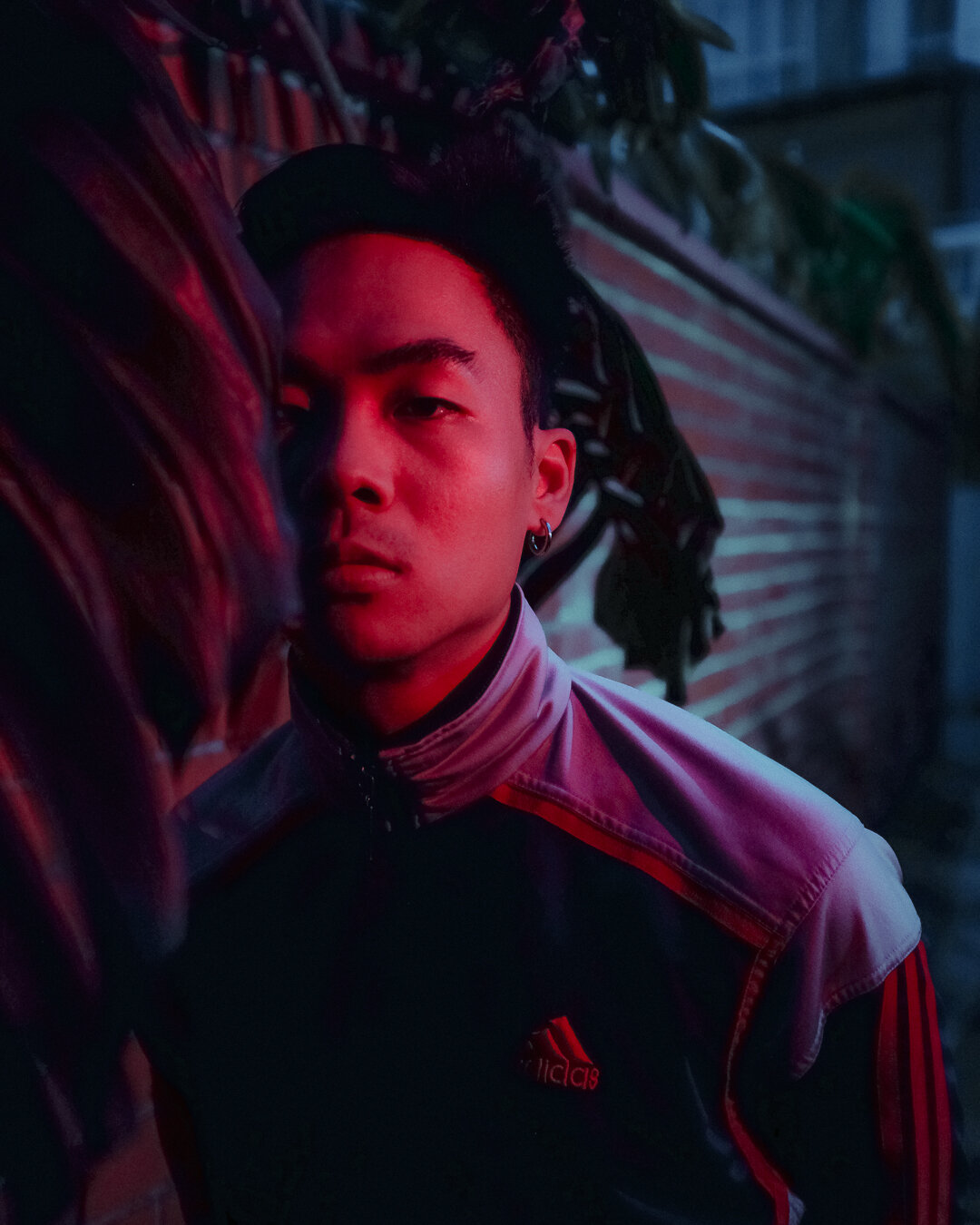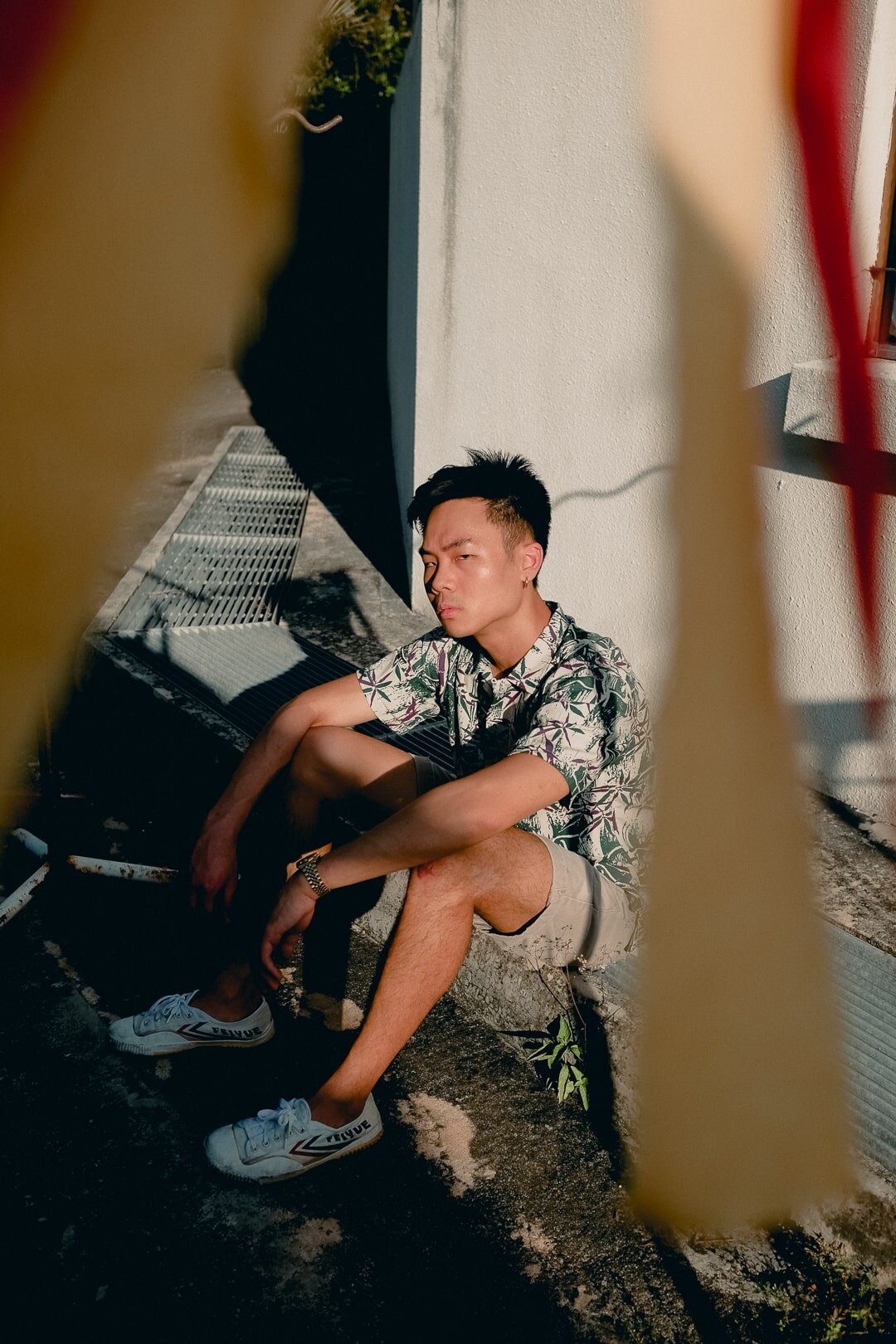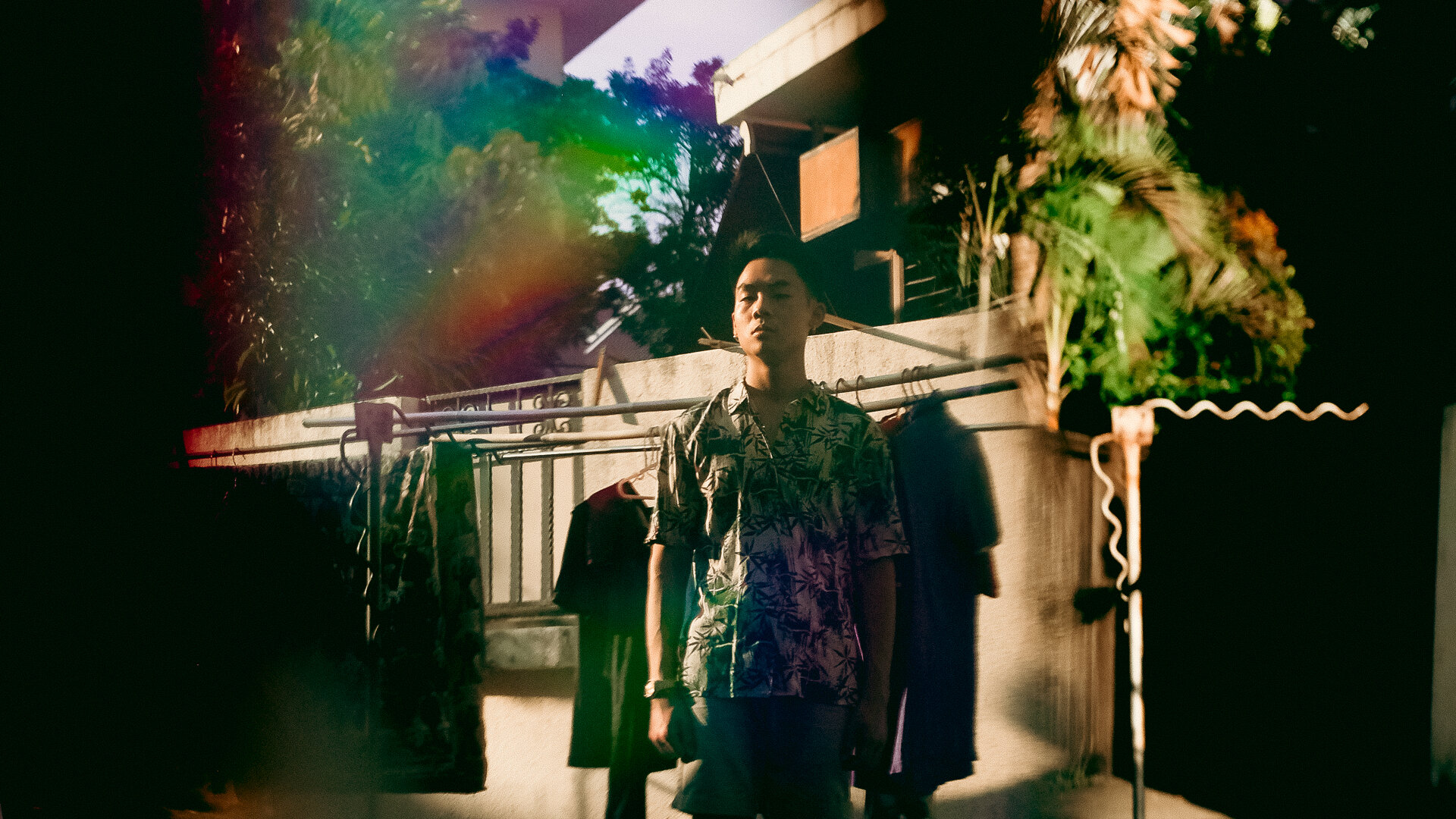
Spicy!
Say Hello to Sambal Snake
He goes by various names: Pedas Python, Belacan Boa, Chili Cobra, Mala Mamba. But whatever the Southeast Asian condiment, Singaporean rapper Sambal Snake possesses an equally spicy attitude. With a distinctively local flavour that peppers his brazen, fiery verses, the independent rapper’s debut single, “Elephant”, left strong impressions with its charming blend of offbeat humour, hard-hitting delivery, and retro-leaning aesthetics – with the track’s music video even landing a premiere with HipHopDX Asia. Set to drop a slew of fresh singles over the next year beginning with his upcoming track, “Singapura”, the Big Duck team linked up with the rapper to learn a little more about the man himself.
Words // Isaac “Yackem” Chiew
Photography // Isyariq Irfan
Lighting // Apai
It’s around 9pm and Sambal treats the Big Duck team to a scrumptious dinner at Fei Fei Wanton Mee. It’s been a long day at the interview’s photoshoot, but the rapper’s light-hearted disposition keeps our spirits up. As we begin our chat, finishing up our servings of scrumptious noodles, I first ask Sambal how he would describe his music. “Well, my style is laid-back and less serious,” he notes about his work, “I think the music I make is very in line with who I am as a person.”
“Elephant” perfectly encapsulates this spirit, with its intricate wordplay hinting at an irreverent, playful personality behind the track’s bombastic, braggadocious sheen. “Put the citrus in a lamp / Yungin Sambal he forever in the / Lime light, rhyme tight, Singapore is crime lite,” the rapper spits on the cheeky opening bars. “When people listen to Sambal Snake, I want it to be this whole absurd experience,” he comments.
On the single, Sambal’s absurdity shines through with shades of zany humour and seemingly effortless charisma, as his equally over-the-top bars present a larger-than-life persona. “I feel like the average Singaporean’s general perception of rap is that it’s either very try-hard or very gangster, and I want to subvert those expectations by doing what I do,” he explains. “I joke around, and I poke fun at both other rappers and myself.”
“I think a good artist is one with intent.” Sambal continues, as he elaborates his approach to his releases as full projects with strong musical and visual elements. Beyond being concerned with just lyricism or flow, Sambal emphasises his focus on crafting specialized, immersive experiences for his audiences, including solid photos and visuals.
“Quality control is very important,” he rationalises. “Although I’m proud of it, “Elephant” is my worst song. In terms of its delivery and arrangement, it’s a 6/10.”




To accomplish his musical vision for “Elephant”, Sambal enlisted some of local hip-hop’s top heavyweights to aid in its production. KNWN, whose credits include beats for ABANGSAPAU and Opus Renegade, produced the track’s locomotive beat, a slice of exhilarating boom-bap reminiscent of ‘90s East Coast hip-hop. “I was going through KNWN’s beat catalogue, and when I heard the beat for “Elephant” I knew that it was the one – it slaps harder than my mother,” Sambal chuckles. The choice was a stylistic decision that went against the grain of the bumping trap beats currently dominating the mainstream, although he was quick to assert his love for trap. “I love trap music, but the boom bap beat was just more unique.”
Sambal also called up Fauxe, one of Singapore’s most prolific producers, to mix and master the track. “Asking Fauxe to do production work for you is the rap equivalent of asking Steve Jobs to make you an iPhone. He’s the GOAT,” he gushes.
“When I heard [his album] Ikhlas for the first time, I knew that he was the guy. I could sit back and I wouldn't need to worry – the mix would confirm sound good.” The rapper thoroughly enjoyed his mixing and mastering sessions with the esteemed producer, having nothing but good things to say about him, his partner, and his cat.

Visually, “Elephant”’s accompanying music video presents a slick amalgamation of fight scenes, local breakfast picks, Good Morning towels, and Feiyue shoes, resulting in a tastefully exaggerated, yet uniquely Singaporean lo-fi confection. However, making the visual a reality was a long, arduous process.
“I learned that it takes effort to look effortless,” Sambal points out, as he names the video’s key visual influences: “Reginald” by Mick Jenkins, “Smoko” by The Chats, and “Everytime” by Boy Pablo in particular. On the cinematic end, the rapper also took cues from both DeNiro gangster movies and flicks like Kung Fu Hustle.
“The music video was a complete DIY effort, but I stuck to my vision,” he insists. To shoot the video, he borrowed a DSLR camera from a friend’s mother for the shoot. In due course, he then taught himself how to use Premiere Pro from scratch to stitch the music video together. “We didn’t know anything about photography so we just shot everything on auto mode. “It took 3 months for me to arrange the video from start to end, so I’m quite happy with the result.”
But even with all his determination, Sambal couldn’t achieve his gargantuan vision alone – so he enlisted the help of some friends to make it work. In addition to a small cast of actors (credited as Handsome Fellas), the rapper also brought in his good friend, videographer Keith Chia, and editor Musuan to aid with the visual’s cinematography and complex edits. “Before the shoot, I had duck rice [with Chia] and discussed the concept and my vision for it for about one or two hours,” he recounts. “We ended up shooting the music video in three separate parts to make it work.”
“There were a lot of tiny details I had to plan out for the shoot,” Sambal recalls. “For example, we had to insert chopsticks into the youtiao (fried dough sticks) to get them to stand, if not they would just become floppy. And for the press shot, the kuehs (Nonya snacks) were so slippery that they kept slipping off my eyes!”
Sipping his honey lemon, Sambal spoke about the fine balance he strove to achieve in the music video. “I think the biggest challenge was managing the context and humour in the video. I wanted the video to be characteristically Singaporean, but not in a way that was overt and tokenistic,” he asserts. “The humour had to be subtle and tongue-in-cheek. I declined many suggestions from others to make it look more slapstick.”
“I learned that it takes effort to look effortless”
Moving on, I ask Sambal about his influences. “Actually, I didn’t listen to rap much until five years ago,” he confesses. “Before that I thought there were only two types of rappers: gangsters from the hood like Jay-Z or the fast, technical rappers like Eminem – they just didn’t resonate with me as a Singaporean Chinese kid.”
Thankfully, Sambal was eventually enlightened, a chance encounter with a live recording of Childish Gambino’s “Bonfire” serving as his gateway into the larger world of hip-hop. “He wasn’t the gangster type,” the rapper mused. “The lyrics were funny and there were many punchlines.” On the track, Childish Gambino served outlandishly braggadocious lyrics (case in point: “Chillin’ with a Filipino, at your local Jollibee / Yeah, I’m in her ass like sodomy”) over a hard rock-leaning beat.
“I’ve pursued other hobbies to varying degrees of mediocrity. But Discovering “Bonfire” at a sleepover with friends made me obsessed with hip-hop music. In 2019, I made the commitment to really make music. I want to take it to the highest level – rap is one of the only things that makes me feel content,” Sambal articulates. “Rap music is such a liberating form of art where I can be whatever and whoever I want to be.”
Starting out, Sambal would book studio sessions at Aeonix Productions to record verses he penned in his free time. “Shoutout to Jian Liang from Aeonix. He's one of the first guys who’s ever recorded my music and has helped me out for 5 years now,” the rapper shares. “I’ll probably never release all of what we recorded, but he gave me a safe space to become a better artist. He never judged me, he just sat there patiently and tracked my wack vocals.” Sambal also gives a special shoutout to sound engineers Darren Chua and Darren Lee for their help and support since the beginning.
In late 2019, Sambal decided to take a dive into Singapore’s underground hip-hop scene – planning to go to SlideOut, a huge showcase of up-and-coming underground rappers, with a friend. However, he was bailed on at the last minute. “In my mind I thought, I could stay at home and be comfortable, or go to the show alone and suffer the awkwardness.'' In the end, the rapper took a leap of faith – making his way down to the now-defunct DECK where the show was held, and had no regrets doing so. “I made so many friends in the scene that night, and that’s where I met KNWN too.” Sambal also voiced his gratitude for the members of currently inactive rap collective Writer’s Block. “When I first started out in 2019, I reached out to them to learn more about the local scene. Slick Bobby, Syd and Mark Candy were kind enough to sit down with me and give me an introduction into the local scene, turning me onto SlideOut. I thought that it was really nice of them since I was basically an unknown at that point.”
Newfound acquaintances from the event would eventually link Sambal up with Amthakid – an underground rapper and producer best known for his track “WEST” and a member of rap collective PONCHO GROUP (FKA UGLY BOYS). “The guys were like, ‘you like dark beats right, you have to talk to Amthakid!’”
The two finally got together as Sambal was ready to make his debut a reality, with Amthakid offering to assist in recording “Elephant”’s vocal track. “I recorded the main vocals for “Elephant” in Amthakid’s room” Sambal recounts. “We had to make sure the space was studio silent, so we turned off the fan and shut the windows to block out all the noise from outside.” The rapper spent a long time trying to get the song right, the duo soldiering on despite a relatively uncomfortable, guerilla setup.
“I’m not a great recording artist, so recording “Elephant” took forever. I probably did a few hundred takes! It felt like a sauna – I was rapping half-naked, sweating my ass off on the mic, but we eventually got it down.” Sambal also made sure to express his gratitude to Amthakid. “Am was there the whole time in that hot, stuffy room, helping me record with no complaints. I really appreciate all his support and patience for a new artist like me.”
Despite all the help he’s received along the way, the rapper’s journey thus far has been mostly a solitary affair. “The first few years were a really lonely process. Don’t get me wrong, it’s a self-imposed loneliness. I didn’t want to join a rap collective or a group right at the start of my artistic journey because I wanted to earn my place in the scene through my own merit,” he establishes. “You may get complacent once you’re part of a group or collective – alone, you’re forced to create your own identity and sound.”
“When it comes to local underground hip-hop there are two broad categories – the indie scene and the underground scene,” Sambal observes. “Sometimes I don’t know where I belong.”
Sambal then shifts gears to talk about his Singaporean influences. “So much of our stuff here is world-class, but it’s hard to make money as an artist here when the general population thinks that local music is trash,” he sighs. “That’s one of the reasons why I have a lot of respect for Singaporean artists, and why many of my personal heroes are local creatives.” The rapper name checks Mediocre Haircut Crew, Slick Bobby, Yung Raja, ahmadjohnson69 (FKA Rusyaidi Rashid), Tengyboy and ABANGSAPAU as the Singaporean rappers he looks up to. “I love Yung Raja because he’s so technically proficient. Every time he steps into a cypher I know he’s gonna destroy it. I automatically feel bad for all the other rappers there,” he marvels.
Outside of local rap, Sambal also cites Sobs, Sam Rui, Charlie Lim, Kin Leonn and Lewloh as some of his favourite musicians. “One day I will hug Charlie Lim,” he jokingly quips. “And Lewloh is just made of 100% talent, he pours his heart out on every track. It was so weird to see “Elephant”, which to me is a joke, on a Spotify playlist next to such beautiful music.”
Reflecting back on his musical journey, Sambal recognises that he has taken a relatively longer, lonelier route, only discovering the joys of hip-hop in his 20s and taking 5 long years to fully form an artistic vision on his own. Nevertheless, he wouldn’t have had it any other way.
“Now’s a good time. On hindsight, I’m happy to have started when I started,” he contemplates, “If I started younger, I wouldn’t have had the maturity to do music in the way I did. I’ve had time to develop my sense of self and set realistic expectations. I don’t create music to garner attention or to fill a void.”
I ask Sambal what he makes music for, as our conversation comes to a fitting close.
“I just really, really love music.”
*Quotes have been edited for clarity








